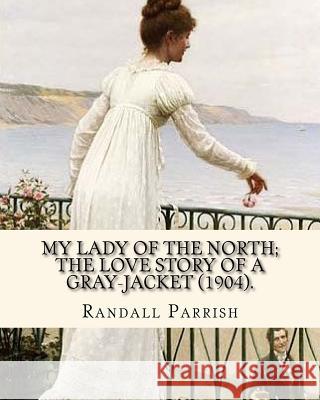My lady of the North; the love story of a gray-jacket (1904). By: Randall Parrish (1858-1923): Randall Parrish (1858-1923) was an American author of d » książka
My lady of the North; the love story of a gray-jacket (1904). By: Randall Parrish (1858-1923): Randall Parrish (1858-1923) was an American author of d
ISBN-13: 9781548856069 / Angielski / Miękka / 2017 / 170 str.
My lady of the North; the love story of a gray-jacket (1904). By: Randall Parrish (1858-1923): Randall Parrish (1858-1923) was an American author of d
ISBN-13: 9781548856069 / Angielski / Miękka / 2017 / 170 str.
(netto: 42,69 VAT: 5%)
Najniższa cena z 30 dni: 44,46
ok. 16-18 dni roboczych.
Darmowa dostawa!
Randall Parrish (1858-1923) was an American author of dime novels, including Wolves of the Sea (Being a Tale of the Colonies from the Manuscript of One Geoffry Carlyle, Seaman, Narrating Certain Strange Adventures Which Befell Him Aboard the Pirate Craft "Namur"). Early life: Parrish was born in the city of Kewanee, the only son of Rufus Parker and Frances Adeline (Hollis) Parrish. He was born in "Rose Cottage" on June 10, 1858, at what was later the site of the city's Methodist Episcopal church. The old family home was at Gilmanton, New Hampshire, but the parents removed to Kewanee from Boston, where Rufus Parker Parrish had been engaged in business and was prominently associated with William Lloyd Garrison and others in the anti-slavery cause. Both parents had a wide acquaintance with the famous Boston citizens of that era, including Longfellow, Holmes, Whittier, Wendell Phillips and Emerson. They came to Kewanee, then the merest excuse of a village, in April, 1855, the husband becoming connected with the pioneer store of Morse & Willard, then situated at the corner of Main and Fourth streets. A little later the firm became Parrish & Faulkner, the business finally being sold to Elias Lyman, being thus the nucleus for the large department store of Lyman-Lay Company. From the time of arrival until his death in 1903 Mr. Parrish was ranked among the most prominent citizens of this community, where he conducted a book store and held many offices of trust. St John's Episcopal church was established and maintained largely through his efforts and for twenty-five years he was president of the public library board. George Randall Parrish was educated in the Kewanee public schools, graduating from the old academy building in the second class, that of 1875, being on that occasion the class prophet. In addition he attended Allen's Academy at Lake Forest, Illinois, and Griswold College, Davenport, Iowa. Deciding upon law as a profession, he took one year at the Union College of Law, Chicago, completing his course at the Iowa State University, where he won the state bar prize for the best essay on a legal topic. He was admitted before the supreme court of Iowa in May, 1879, but his certificate was withheld until he became of age. Mr. Parrish went immediately to Wichita, Kansas, and became an assistant in the law office of William C. Little, a year later forming a partnership with E. S. Martin, at one time principal of the Kewanee high school. Devoting much time to politics and having achieved a reputation as a public speaker, he was elected city attorney, besides being a delegate to county and state conventions. His health breaking down from close confinement, he crossed the plains in 1882 with a cattle party, walking most of the way to Las Vegas, New Mexico. Arriving there he discovered conditions had arisen in Wichita which left him practically moneyless and compelled him to labor at anything possible. During the next few months he worked at track-laying, engine wiping and firing between Las Vegas and Albuquerque, on the Atchison, Topeka & Santa Fe Railroad, finally going as a sheep driver to Fort Sumner. He was camped on the outskirts of that place when Billy the Kid was killed by the sheriff of Lincoln County, and saw the desperado both before and after death. Joining a party of prospectors, the next few months were passed in the wildest regions of Arizona. Gold was found, but within the limits of an Apache reservation, and the party was driven out by United States soldiers. After suffering many hardships en route, Mr. Parrish reached Greeley, Colorado, and secured work on the Greeley-Loveland canal, a little later making his way to Denver....
Zawartość książki może nie spełniać oczekiwań – reklamacje nie obejmują treści, która mogła nie być redakcyjnie ani merytorycznie opracowana.











